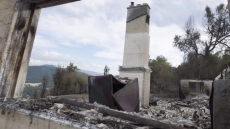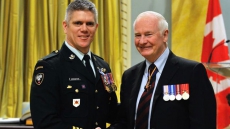TORONTO — The Ontario Court of Appeal has upheld the conviction of a man portrayed as a minor player in the so-called Toronto 18 terror plot.
Asad Ansari had appealed the guilty verdict delivered by a jury in June 2010 on the grounds that the trial judge admitted improper evidence — including letters found on his bedside table in which he discussed fighting "for the sake of Allah" — and made errors in his charge to the jurors.
In his appeal, Ansari said the letters to his family were prejudicial evidence. He had argued at trial that the messages were draft suicide notes and that the reference to fighting was a red herring because he believed Islam did not allow suicide.
He also took issue at appeal with the manner in which investigators intercepted private communications that were presented as evidence.
But the three-judge appeal panel sided with the trial judge, saying the letters were "relevant to the case" and the intercepts had "no negative impact" on Ansari's privacy.
Ansari was found guilty of participating in a terrorist group — one of the two final verdicts in a massive case that saw 18 people charged with terrorism offences.
Men and youths dubbed the Toronto 18 were arrested in 2006 and accused of looking for Canadian sites — such as the Parliament Buildings in Ottawa — to target in an attack.
Ansari was released on bail in August 2009, and was sentenced in December 2010 to time served with three years of probation.
He and co-accused Steven Chand were the only ones tried by jury.
Seven others accused in the plot had their charges dropped or stayed, two were found guilty at trial by judge and seven pleaded guilty.
Ansari and Chand were on trial with Fahim Ahmad, who pleaded guilty mid-trial to leading a terrorist group, instructing others to carry out activities for the benefit of a terrorist group and importing firearms for the benefit of the terrorist group.
The jury heard weeks of evidence that Ahmad was plotting to attack Parliament, electrical grids and nuclear stations and that he held training camps to assess the suitability of recruits for his cause.
The jury had heard that Ansari attended one of those camps in December 2005 and fixed Ahmad's computer.
At issue during trial was whether Ansari's presence at the camp and his technological help amounted to participating in a terror group, and whether he had the requisite knowledge of that purpose.




